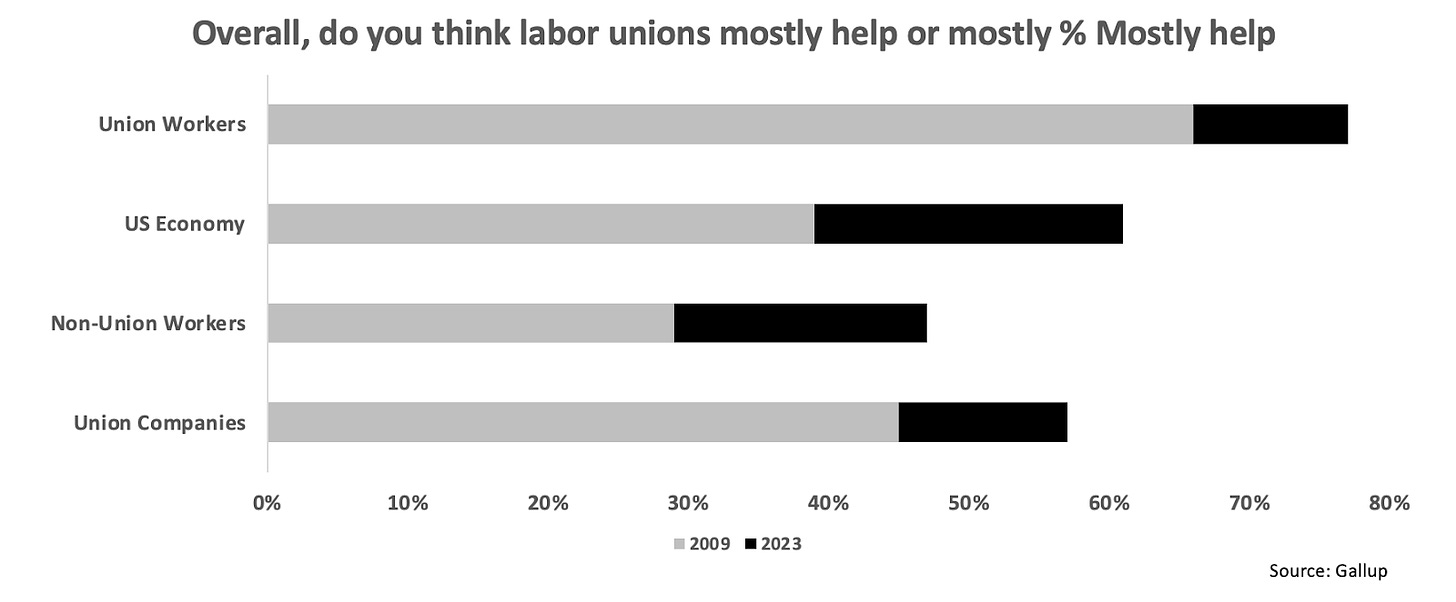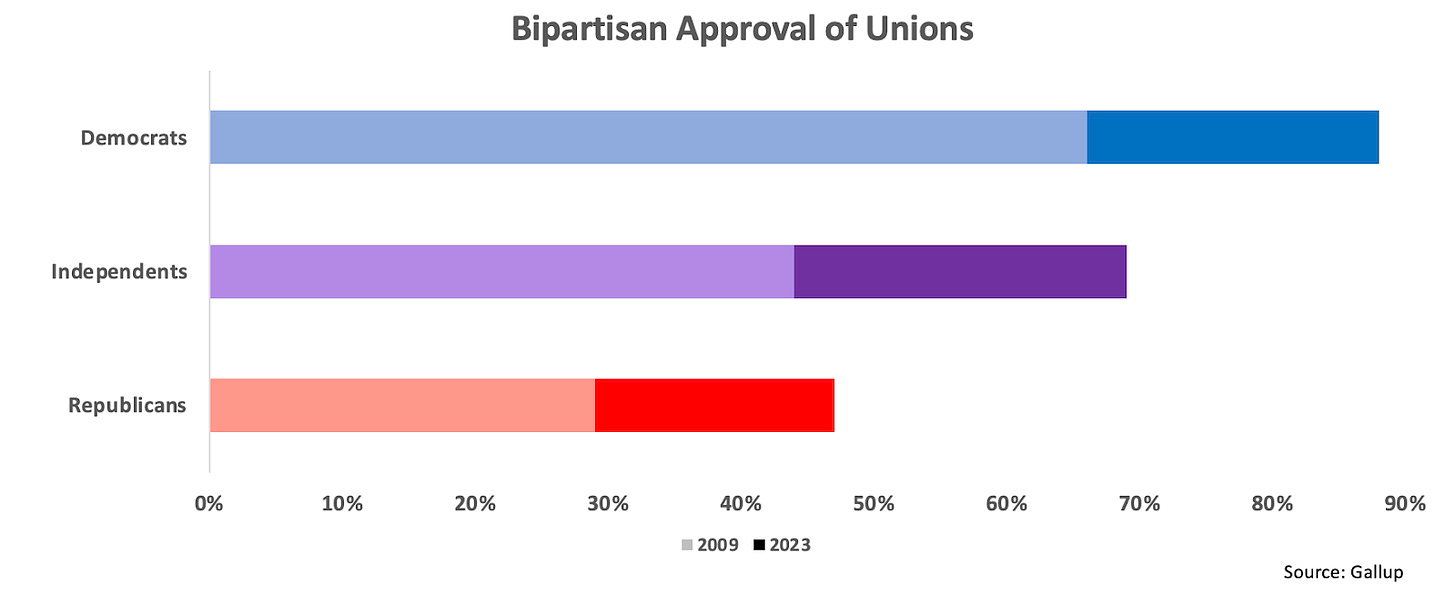Author Michael Podhorzer:
“The contrast couldn’t be more striking. On one side: Joe Biden and Kamala Harris walking the picket line with striking UAW workers, and Harris launching her campaign in Milwaukee declaring her support for the freedom of working people to join unions. On the other side: Trump and Elon Musk gleefully cackling about firing striking workers, as Musk and other plutocratic Trump supporters hope for the Federalist Society (FedSoc) Supreme Court justices to declare the entire NLRB, if not collective bargaining itself, unconstitutional. As this post will show, their hostility to unions is a prerequisite for the success of their broader political project.
“First, you may have heard that public support for unions “has been increasing” – but you probably haven’t heard just how big a deal that is in the context of the last 15 years. Since the Great Recession, we’ve seen the credibility of, and approval for, just about every major institution plummet – yet we’ve seen support for unions increase. …
“Those trends become even more pronounced if we look at the change in the difference between those who have a great deal or quite a lot of confidence in the institution and those who have very little confidence in the institution. …”
[Mr. Podhorzer supports this increase with numerous data examples and polls. Click here to see the data.]
“There’s more. Look at the change from 2009 to 2023 in this Gallup polling question on unions. Respondents are asked whether they think unions “mostly help” or “mostly hurt” a list of things, including union workers, non-union workers, the US economy, and union companies. It’s not surprising that nearly everyone (almost 80%) believes unions mostly help union workers. What is striking is two things: (1) a substantial majority of Americans (roughly 60% in both cases) also believe that unions mostly help the US economy and the unionized companies; and (2) the “mostly help” numbers have increased substantially across the board since 2009 – but most dramatically for “US economy” and “non-union workers.”

“Moreover, while opinions about nearly everything else – from the economy to presidential approval to the effectiveness of vaccines – have sharply diverged along partisan lines in this period, approval for unions has increased across the partisan board.

“Why is all of this happening? Why are unions enjoying a cross-partisan surge of not just approval, but a widely shared recognition that everyone benefits when unions are stronger? The answer is simple and powerful – and almost completely invisible in our current media landscape.
“Let’s be honest: If you’re reading this post, chances are good that you have at least some agency in your working life. You might be a knowledge worker who can telecommute, you might have pretty good pay and benefits, you might manage other people, and so on. Chances are also good that you strongly support unions. You might read about a successful UAW strike and think, “Yay! Good for them!”
“That’s not the experience of most working-class people in America, especially if they do not belong to a union. They and their peers often have little or no agency in their work life – unpredictable schedules, no paid leave, dangerous working conditions, and the ever-present threat of being fired at will. When they see other working-class people like them standing up to their bosses and winning, it’s a game-changer. They don’t think, “Yay! Good for them!” They think, “Fuck yeah! I want that too!”
“This “fuck yeah” is exactly what scares plutocrats like Trump and Musk the most. It’s the seed of social proof that blossoms into meaningful solidarity and powerful collective action. As Frederick Douglass famously said, “power concedes nothing without a demand” – and a true “demand” is much more than, say, a preference revealed on an issue poll. Entrenched power will only respond to demands that are wielded by a countervailing power. Ordinary people need institutional collective power to make their demands heard, let alone met.
“To be clear, voting is an essential democratic freedom, but it’s not the collective power I’m talking about. Voting is like going to a restaurant and choosing between entrees on the menu. Collective power is like sitting at the table deciding what’s on the menu.
“Broadly speaking, America only has two major civil society institutions left that allow ordinary people to exercise the latter form of power. One is unions. The other is churches – specifically, white Evangelical churches. I explained how the latter institution has taken over the Republican Party and fueled the MAGA movement in “How White Christian Political Might Made the Republican Party Hard Right, in 8 Charts.”
“There are crucial differences though: unions themselves are democratic institutions, while political Christianity is not. Unions are supported exclusively by their members’ dues, while political Christianity has long been subsidized by capitalists, especially in the extractive industries, as well as by favorable tax treatment.
An Extraordinary Natural Experiment
“In the next section, we’ll look at what kinds of results the two institutions have helped achieve in different regions of the country. Spoiler alert: unions contribute to virtuous cycles of more democracy, agency, inclusion, and flourishing; the white Christian nationalism of political Christianity contributes to vicious cycles of more repression, social control, racial/gender hierarchies, and inequality.
“After the 2008 election, 157 million Americans lived in 26 so-called “right to work” (RTW) states, and the other 174 million lived in the 24 states in which there was greater freedom to join a union, which I will call a “right to union” (RTU) state.”
[In summary, RTU states see abortion rights protected, increased investment for spending on education, better protection for voting rights, higher wages, and stronger protections for workers and the right to organize.]
FROM THE EDITOR: Author Michael Podhorzer is the former political director of the AFL-CIO. Senior fellow at the Center for American Progress; Founder: Analyst Institute, Research Collaborative (RC); Co-founder: Working America, Catalist. He publishes Weekend Reading. (weekendreading.net). The above is an excerpt from As Go Unions, So Goes America. The full column has even more value, packed full of statistics and how the details matter between “right to work” (RTW) and “right to union” (RTU) states in the pocketbooks of RTU’s growing middle class.
